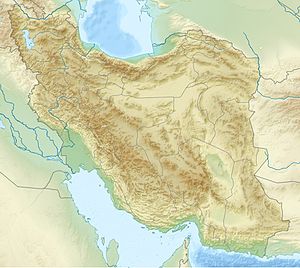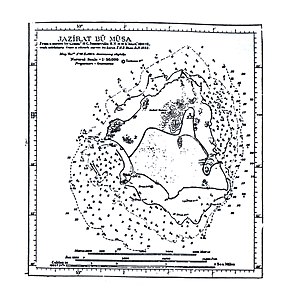Abu Musa
| Jazīre-ye Abū Mūsā | ||
|---|---|---|
| Map of the Strait of Hormuz with Abu Musa | ||
| Waters | Persian Gulf | |
| Geographical location | 25 ° 52 ′ 0 ″ N , 55 ° 2 ′ 0 ″ E | |
|
|
||
| length | 5 km | |
| width | 4.9 km | |
| surface | 12 km² | |
| Highest elevation | Jebel Halwa 110.3 m |
|
| Residents | 4213 (September 24, 2016) 351 inhabitants / km² |
|
| main place | Abū Mūsā | |
| Historical map | ||
Abu Musa ( Persian ابوموسی; also Abū Mūsā , Abu Mussa or Gap-Sabzu ) is an island in the east of the Persian Gulf .
The island of Abu Musa also gives its name to the district of the same name in the Iranian province of Hormozgan , which consists of five other islands ( Groß-Tunb , Klein-Tunb , Groß-Farur, Klein-Farur and Siri). The island is about 12 km² and had 4213 inhabitants at the census of September 24, 2016, which they mostly with the Persian nameگپسبزو( Gap-sabzu ) denote (in German roughly "large green place"). The name "Abu Musa", however, is derived from Bum-e Musa ("Land of Moses ") or Bumuf .
Conflict between Iran and United Arab Emirates
There is a territorial dispute over Abu Musa between Iran and the United Arab Emirates . There is no general agreement as to which country Abu Musa belongs to. Because of the suspected oil reserves and the militarily advantageous location, both Iran (for the province of Hormozgan) and the United Arab Emirates (Emirate of Sharjah ) lay claim to Abu Musa. The island was under the rule of Sharjah until the 1960s. However, when the British forces withdrew from the region, Iran laid claim to them, justifying this on the basis of historical facts. Great Britain had occupied several Iranian islands in 1903/04, including Abu Musa, and these later under the sovereignty a. a. given by Sharjah to weaken Iran (then still Persia). In a treaty in 1971, Iran and Sharjah could not agree on a clear sovereignty of one side over the island; Iran was able to prevail and on November 30, 1971 troops stationed on Abu Musa, which have controlled Abu Musa since then. One wants to share income from oil discoveries; civil administration should be in the hands of the Arab residents.
Iran very soon transferred troops to the island and over time took control of it and the neighboring Tunb Islands . Sharjah took action against Iran's behavior at the diplomatic level and was largely unsuccessful.
In 1980 the UAE, to which Sharjah now belonged, submitted their claim to Abu Musa to the UN . In 1992, Iran ordered the expulsion of all foreigners from Abu Musa, which resulted in the UAE calling on the Gulf Cooperation Council (GCC). Iran initially affirmed its claim to the island; soon, however, the UAE and Iran jointly announced that they were bound by the 1971 agreement.
Iran has retained control of Abu Musa and has even expanded its military presence. In 2002 he completely took over the formerly autonomous civil administration. The UAE continues to claim sovereignty; they are supported in this by the GCC. A solution to this pending conflict is currently not in sight.
On April 11, 2012, Mahmoud Ahmadinejad was the first Iranian president to visit the island. The Gulf Cooperation Council described the visit as "provocative" and the island as "an inseparable part of the United Arab Emirates".
Restricted military area
The island is now a restricted military area and has a port and an air force base . In 1994/95 soldiers of the Iranian Revolutionary Guard , anti-aircraft missiles of the type MIM-23 HAWK and land-based anti-ship guided missiles of the type CSS-C-2 Silkworm were stationed.
The Iranian Navy has repeatedly arrested fishermen from Oman and the UAE as well as numerous sport fishermen for violating borders. In 2006, the case of the saw Donald Klein from Lambsheim a stir in the German-speaking world when it was applied together with a French crew and their boat in late 2005 by an Iranian ship near the island and the beginning of 2006 an Iranian court both to 18 months ' imprisonment for convicted of illegal border crossing.
literature
- Richard Schofield: Unfinished Business. Iran, the Uae, Abu Musa and the Tunbs . Royal Institute of International Affairs, London 2003, ISBN 0-905031-90-3 .
- Rouhollah Shahabi: The causes of the conflict in the Persian Gulf with special consideration of the conflict between Iran and the United Arab Emirates over the three islands of Abu-Musa, Great-Tonb and Small-Tonb . Inaugural dissertation to obtain a doctorate from the University of Siegen. Wins 2003.
Web links
- Website of the military on the island ( Engl. )
- Private Iranian website with maps of the island and its surroundings ( Memento of 8 December 2007 at the Internet Archive ) ( Engl. )
- Maps of Abu Musa and the five neighboring islands
Individual evidence
- ^ "Iran occupies three islands in the Persian Gulf" in Schwäbische Zeitung of December 1, 1971, p. 2
- ↑ The island dispute heats up tensions in the Gulf ( Memento from May 8, 2012 in the Internet Archive )
- ↑ http://de.rian.ru/politics/20120418/263384321.html


